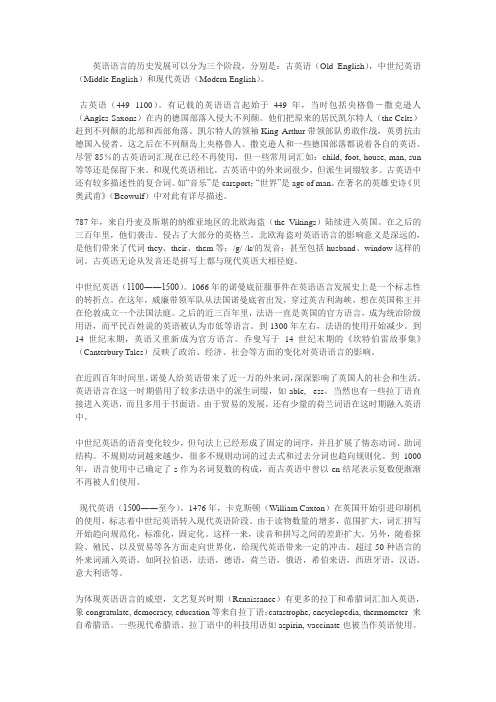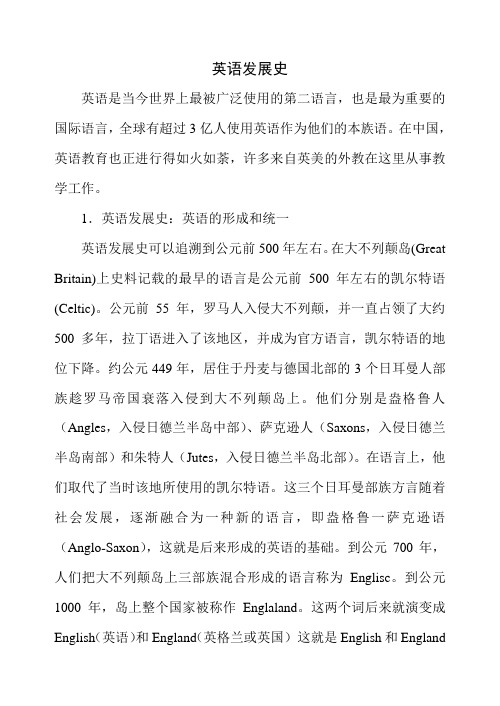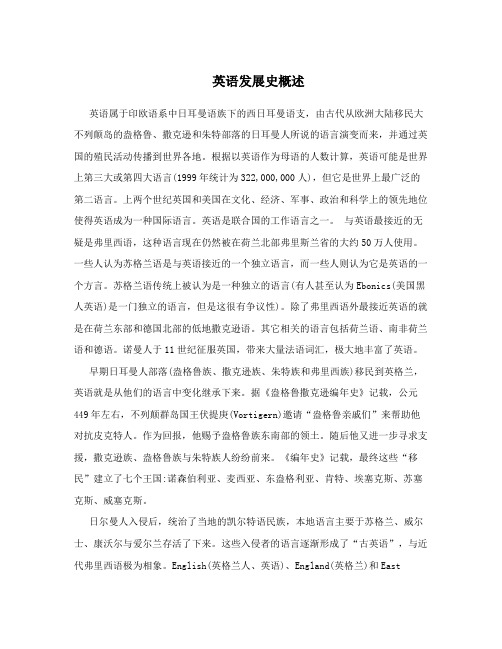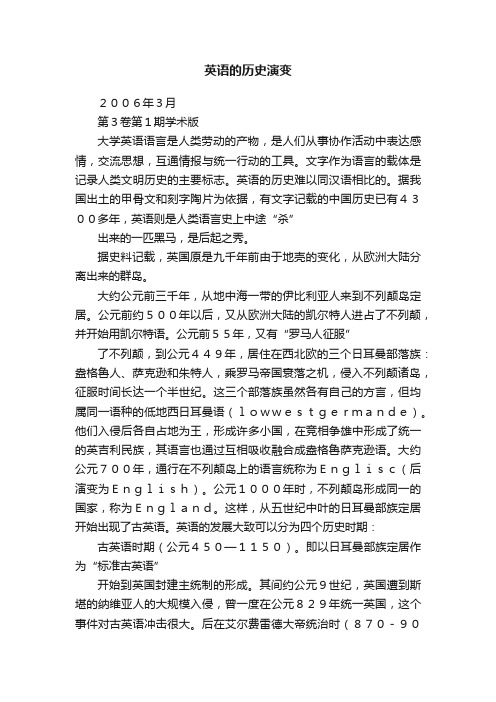英语发展简史精选文档
英语发展史

随后,又发生了诺曼人 诺曼人(Normans)的入侵 的入侵。 随后,又发生了诺曼人(Normans)的入侵。 诺曼人原先也来自斯堪的纳维亚。 诺曼人原先也来自斯堪的纳维亚。他们在 法国北部诺曼底(Normandy)省定居下来 省定居下来, 法国北部诺曼底(Normandy)省定居下来, 接受了诺曼底省的法语,作为他们的语言。 接受了诺曼底省的法语,作为他们的语言。 诺曼法语(Norman French)是法语的一种 诺曼法语(Norman French)是法语的一种 方言,不同于首都巴黎一带的法语。 方言,不同于首都巴黎一带的法语。首都 法语称为中心法语(central French), 法语称为中心法语(central French),是法 语的标准语。 语的标准语。
A Brief Introduction of American English
ห้องสมุดไป่ตู้
美国英语源于伊莉莎白时期的英语, 美国英语源于伊莉莎白时期的英语,其历史和 美国的移民史有着非常密切的联系, 美国的移民史有着非常密切的联系, 美国移民史可以追述到300多年前 1607年 多年前。 美国移民史可以追述到300多年前。1607年,约 史密斯(John Smith)等首批殖民者 等首批殖民者120人乘 翰•史密斯(John Smith)等首批殖民者120人乘 三艘大船横越大西洋,在弗吉尼亚州(Virginia) 三艘大船横越大西洋,在弗吉尼亚州(Virginia) 的詹姆斯河口建立了詹姆斯城(Jamestown)。 的詹姆斯河口建立了詹姆斯城(Jamestown)。 随后不久, 1620年 随后不久,在1620年,从英国东部诺福克郡和沙 福克郡来的清教徒乘坐“五月花号” 福克郡来的清教徒乘坐“五月花号”(May Flower)船驶抵马萨诸塞州 Flower)船驶抵马萨诸塞州(Massachusetts) 船驶抵马萨诸塞州(Massachusetts) 的东南部普利茅斯(Plymouth), 建立了殖民地。 的东南部普利茅斯(Plymouth), 建立了殖民地。
英语发展简史

英语发展简史英语起源与发展的简短介绍英语真正的历史应该从公元5世纪时入侵英国的三个日耳曼部落说起. 这几个部落分别是, 盎格鲁人, 撒克逊人,和朱特人,他们从今天的德国北部和丹麦出发,然后横渡北海。
那时候英国的本地居民都说凯尔特语。
但由于入侵者的逼迫,他们都被赶到了西部和北部-主要是现在的威尔士,苏格兰和爱尔兰。
盎格鲁人来自Englaland他们的语言称为Englisc(古英语)-这两个词就是现在England和English的前身。
日耳曼入侵者在公元5世界通过英国东海岸和南海岸进入英国。
古英语时代(450-1100AD)入侵英国的这几个日耳曼部落,其语言基本相近,这些语言的融合形成了我们现在称的古语言。
古英语的发音与书写与现在的英语并不一样。
因此以英语为母语的人对于阅读古英语也有很大的困难。
然而,现代英语最常用的词语中,大约就有一半起源于古英语。
例如be,strong和water。
古英语一直被使用到1100年左右。
用古英语写就的诗,《贝奥武夫》的一部分中世纪英语 (1100-1500)1066年,诺曼底(现法国的一部分)公爵威廉率兵征服了英国。
征服者带来了他们的语言-一种法语,而这也成为皇室法庭,统治阶级和商人阶级的语言。
曾经一段时间,出现了以语言区分阶级的现象,下层阶级说英语,上层阶级说法语。
在14世纪英语重新成为英国主流语言,但也增加了许多法语单词,这就是中世纪英语。
伟大的诗人乔叟就是这种语言,但对于今天的人来说仍旧十分难懂。
现代英语早期现代英语 (1500-1800)随着中世纪英语的泯灭,发音突然发生了很大的变化(元音大推移),元音的发音越来越短。
而从16世纪起英国与世界的接触多了起来,再加上文艺复兴的影响,导致越来越多的单词和短语被添加到英语中。
印刷术的发明使得书面语流行起来。
书变得越来越便宜,更多的人开始学习阅读。
拼写和语法变得越来越固定,而由于伦敦市大多数出版社的所在,伦敦方言就变成了标准语言。
英语发展史

A Brief History of English
英语属于印欧语系Indo-European当中的日耳曼语 英语属于印欧语系Indo-European当中的日耳曼语Germanic。印欧 当中的日耳曼语Germanic。 语系是全世界最大的语系之一,属于这个语系的语言地理分布最广, 语系是全世界最大的语系之一,属于这个语系的语言地理分布最广, 说这些语言的人数最多。早在1786年英国梵文学者咸廉 年英国梵文学者咸廉· 说这些语言的人数最多。早在1786年英国梵文学者咸廉·琼斯爵 Jones)发表了他在语言学领域里的惊人的发 士(William Jones)发表了他在语言学领域里的惊人的发 梵文Sanskrit和希腊语 和希腊语Greek、拉丁语Latin是同源的 是同源的。 现:梵文Sanskrit和希腊语Greek、拉丁语Latin是同源的。这三种语 言都是从原始的印欧语演变来的。几千年以的,在欧洲中东部( 言都是从原始的印欧语演变来的。几千年以的,在欧洲中东部(相当 于立陶宛的地理位置)居住着具有石器时代文明的游牧民族nomads 于立陶宛的地理位置)居住着具有石器时代文明的游牧民族nomads , nomadic people[nəu'mædik]的部落——这就是原始的印欧人。他 people[nəu'mædik]的部落 的部落——这就是原始的印欧人 这就是原始的印欧人。 们的语言就是原始的印欧语Indo-European。 们的语言就是原始的印欧语Indo-European。 大约在公元前三千年的时期,这些游牧部落开始迁徒 公元前三千年的时期 迁徒。 大约在公元前三千年的时期,这些游牧部落开始迁徒。其中一些 部落向南方移动,经过南欧,最后到达南亚次大陆。 部落向南方移动,经过南欧,最后到达南亚次大陆。这就是为什么古 印度语(梵文)和古代欧洲语言(希腊语和拉丁语)非常相似的原因。 印度语(梵文)和古代欧洲语言(希腊语和拉丁语)非常相似的原因。由 于原始印欧人部落的移动,原始印欧语就分化成各种不同的方言, 于原始印欧人部落的移动,原始印欧语就分化成各种不同的方言,这 些方言就是印欧语系各语文的祖先。 些方言就是印欧语系各语文的祖先。 “英语”原意“地角语言”。5世纪中叶(中国南北朝时期),欧洲 世纪中叶(中国南北朝时期), ),欧洲 英语”原意“地角语言” 大陆一个部落叫做“地角人” Engle), ),从石勒苏益格 大陆一个部落叫做“地角人”(Engle),从石勒苏益格 Schleswig,现在德国北部)渡海移居不列颠(Britain)。 )。他们的 (Schleswig,现在德国北部)渡海移居不列颠(Britain)。他们的 地角语” Englisc,古拼法)代替了当地的凯尔特语(Celtic)。 “地角语”(Englisc,古拼法)代替了当地的凯尔特语(Celtic)。 于是地区称为“英格兰” 语言称为“英语” English, 于是地区称为“英格兰”,语言称为“英语”(English,现代拼 法)。
【精品】英语的起源、发展和演变84206精品课件

• 词义的贬降degradation of meaning如:villain 原指“在农庄或郊区住宅干活的农 夫”,今天则指“恶棍”;silly 原作“高兴的”、“幸福的”解,今天却作“傻 的”、“愚蠢的”解等。 (返回)
• 创造新词(coinage)如:cladistics(遗传分类学),be-in(颓废派的社交集会), frisbee玩具飞蝶等。
• 合成法(blending)如:Pekingology(=Peking+o+logy;北京问题研究),boatel (=boat+hotel;汽艇游客旅馆), cultureal gap(文化差距), moonscape(月 景),youthquake(青年动乱)等。
中古英语时期(12世纪─1 6世纪)
• 英语成为正式语言 • 《圣经》英译本出现
英语成为正式语言
• 从13世纪开始,用英语创作的民族文学作品在各方言地区陆续出现。 虽然拉丁语和法语仍被用作文学语言,但是具有创造性的重要作品都是 用英语写的。从13世纪后半期开始,英语逐渐代替了法语和拉丁语, 成为英国全国政治生活和社会生活的正式语言,而且也成为正式的文学 语言。1258年10月18日的“亨利三世的公告”是征服英国的诺曼国王威 廉一世(William I) 之后用英语发表的公告,虽然这个公告同时也用拉 丁语和法语发表。到了14世纪,英语在国家和社会各部门中都获得了 完全胜利。1362年爱德华三世(Edward III)召开议会时第一次用英 语致开幕词。同年,由于下议院的请求,爱德华颁布了一道法令,规定 法庭审讯必须用英语,而不再用法语。1385年英语已代替了法语作 为学校中的正式语言。1386年人们第一次用英语书写给议会的请愿 书。英语不仅成了宫廷、学校、法院、议会和行政的语言,而且在学术 界和宗教界占了主导地位。被誉为“诗圣”的杰弗里·乔叟(Geoffrey Chaucer,1340─1400),虽然也精通法语和拉丁语并模仿法国 和意大利的诗歌,但他始终用英语写作。他以自己的榜样启发了许多同 时代和后来的诗人们用祖国的语言写作。
黑人英语演变历程及发展趋势-精选教育文档

黑人英语演变历程及发展趋势由于语言是在不断运用着的,所以,任何语言都是动态的,黑人英语也不例外。
根据其基本特征进行划分,黑人英语大致经历了四个发展阶段:洋泾浜语阶段、克里奥语阶段、克里奥语解体化阶段、独立语言阶段。
一、洋泾浜语阶段。
洋泾浜语是指操不同语言的群体为完成某种有限的交际需要而发展起来的一种辅助语言。
洋泾浜语是黑人英语初始形式,形成于十七世纪。
十七世纪时,欧洲贩奴者把黑人从西非船运到加勒比海岛屿和美洲海岸为奴。
奴隶交易持续了近二百年,数百万的非洲奴隶被卖到了美国。
因为怕奴隶们组织谋反,贩奴者经常故意把来自不同种族、操不同语言的奴隶安排在一起贩运。
这些奴隶为了交流,创造了几种洋泾浜语,其中,最普遍使用的是奴隶们的非洲语与水手的英语混合而成的洋泾浜语。
黑人奴隶到达加勒比海岛屿或北美海岸后,在工作和生活中继续使用这种洋泾浜语来互相交流或与庄园主进行交流。
黑人洋泾浜语的词汇大多来自殖民语言――英语,但其发音和连词成句的方式则取自非洲语。
其主要使用者是黑人,因为白人主人和黑人奴隶之间的交际是有限的,并且,如无特殊需要没有白人愿意学习它。
二、克里奥语阶段。
克里奥语是指已成为某一言语群体母语(本族语)的洋泾浜语,已用于该群体部分或全部的日常交际的一种语言。
在美国内战前,黑人英语属于一种克里奥语。
当非洲奴隶的第二代长大后,不能说其父母的本族语,因为这样无法与外人进行交流。
他们也学不到白人标准的英语,因为白人为保持其高度的民族优越感而限制他们接受教育。
加之他们与白人的接触少之又少,只能接受这个洋泾浜语为母语,使其成为他们的本族语。
黑人英语就这样转变为克里奥语。
虽然克里奥语延续了洋泾浜语的简单结构,二者还是有明显区别的。
洋泾浜语的正确度和纯度没人过多地关注,其功能也很有限。
而发展了的洋泾浜语――克里奥语,却能表达人类全部生活经验,并逐步形成自己常用的词汇、句法和规范的发音模式。
三、克里奥语解体化阶段。
克里奥语解体化是克里奥语与标准语变得更接近的过程。
英语发展简史

THE HISTORY OF THE ENGLISH LANGUAGETHE HISTORY OF THE ENGLISH LANGUAGE From English Department of ABTCEdit by Tian Yi Edit by Tian YiA p r i l . 1 7 .2 0 1 2 A DThe history of the English language really started with the arrival of three Germanic tribes who invaded Britain during the 5th century AD. These tribes, the Angles, the Saxons and the Jutes, crossed the North Sea from what today is Denmark and northern Germany. At that time the inhabitants of Britain spoke a Celtic language. But most of the Celtic speakers were pushed west and north by the invaders -mainly into what is now Wales, Scotland and Ireland. The Angles came from Englaland and their language was called Englisc -from which the words England and English are derived.Old English State of Englishe-Biz 稳定化(稳定期)Middle EnglishModern EnglishEarly Modern EnglishLate Modern EnglishOld English (450-1100 AD)The invading Germanic tribes spoke similar languages, which in Britain developed into what we now call Old English. Old English did not soundor look like English today. Native English speakers now would have great difficulty understanding Old English. Nevertheless, about half of the most commonly used words in Modern English have Old English roots. The words be, strong and water, for example, derive from Old English. Old English was spoken until around 1100.Part of Beowulf, a poem written in Old Englishwe lufodon 我们爱过he lufode 他爱过þu lufodest 你爱过ic lufode 我爱过ic lufie 我爱þu lufast 你爱he lufaþ 他爱we lufiaþ 我们爱Here are some examples of old English :Middle English (1100-1500)An example of Middle English by Chaucer. In1066 William the Conqueror, the Duke ofNormandy , invaded and conquered England.The new conquerors (called the Normans)brought with them a kind of French, whichbecame the language of the Royal Court, andthe ruling and business classes. For a periodthere was a kind of linguistic class division,where the lower classes spoke English andthe upper classes spoke French. In the 14thcentury English became dominant in Britainagain, but with many French words added.This language is called Middle English. Itwas the language of the great poet Chaucer(c1340-1400), but it would still be difficult fornative English speakers to understand today.Modern EnglishEarly Modern EnglishTowards the end of Middle English, asudden and distinct change inpronunciation started, with vowels beingpronounced shorter and shorter. Fromthe 16th century the British had contactwith many peoples from around theworld. This, and the Renaissance ofClassical learning, meant that many newwords and phrases entered the language.The invention of printing also meant thatthere was now a common language.Printing also brought standardization toEnglish., where most publishing houseswere, became the standard. In 1604 thefirst English dictionary was published.Modern EnglishLate Modern EnglishThe main difference between Early Modern English and Late Modern English is vocabulary. Late Modern English has many more words,arising from two principal factors: firstly, the Industrial Revolutionand technology created a need fornew words; secondly, the BritishEmpire at its height covered onequarter of the earth's surface, andthe English language adoptedforeign words from many countries.Goble languageEnglish has now inarguably achievedglobal status. Whenever we turn onthe news to find out what's happeningin East Asia, or the Balkans, or Africa,or South America, or practicallyanywhere, local people are beinginterviewed and telling us about it inEnglish. To illustrate the point whenPope John Paul II arrived in the MiddleEast recently to retrace Christ'sfootsteps and addressed Christians,Muslims and Jews, the pontiff spokenot Latin, not Arabic, not Italian, notHebrew, not his native Polish. Hespoke in English.。
英语发展历史总结范文

英语,作为当今世界上使用最广泛的语言之一,其发展历史源远流长,充满了丰富的文化内涵和演变过程。
从公元410年罗马人离开不列颠,到如今成为国际交流的通用语言,英语的发展历史大致可以分为以下几个阶段。
一、古英语时期(公元5世纪-11世纪)公元5世纪,日耳曼人中的盎格鲁、萨克逊和朱特三个部族入侵不列颠岛,带来了他们的语言——盎格鲁-萨克逊语,这成为了英语的基础。
在此期间,英语逐渐形成并发展,但受限于当时的历史条件,其发展速度相对缓慢。
二、中古英语时期(公元11世纪-15世纪)1066年,诺曼底公爵威廉征服英格兰,带来了法语。
此后,法语对英语产生了深远的影响,许多法语词汇和语法结构被吸收到英语中。
这一时期的英语被称为中古英语,其特点是词汇丰富、语法复杂。
三、早期现代英语时期(公元15世纪-17世纪)15世纪末,英国人开始使用活版印刷术,这极大地推动了英语的传播和发展。
此外,莎士比亚等文学巨匠的出现,使得英语逐渐成为文学语言。
这一时期的英语在词汇、语法和发音等方面都发生了很大的变化。
四、现代英语时期(公元18世纪至今)18世纪,英国成为世界霸主,英语逐渐成为国际通用语言。
这一时期的英语在词汇、语法和发音等方面趋于稳定,同时也吸收了许多其他语言的词汇。
现代英语的语法结构更加规范,发音也更加标准。
总结:英语的发展历史是一个不断演变、吸收和融合的过程。
从古英语时期的日耳曼语系,到中古英语时期吸收法语,再到现代英语时期成为国际通用语言,英语在发展过程中不断吸收其他语言的优秀元素,形成了独特的文化内涵。
英语的发展历程,不仅展示了语言的魅力,也反映了人类文明的交流与融合。
在今天这个全球化时代,英语的重要性愈发凸显,学习英语已成为全球人民的共同需求。
英语语言的发展史

c)公元16世纪以后—晚期借词,多半是书面 语(P189-15) William Caxton (威廉· 卡克斯顿、英国印 刷商、翻译家) European Renaissance(文艺复兴) e.g: capsule 胶囊,密封小容器;
habitual 惯常的; catastrophe 大灾难; thermometer 温度计;
Middle English (1100-1500)
• 诺曼征服(Norman பைடு நூலகம்onquest) (P189-14) 公元1066年,诺曼人在征服王威廉率领 下,横渡英吉利海峡,在哈斯丁战役中击 溃了盎格鲁-萨克森军队,英王哈路德战死, 英国被征服。这在历史上被称为诺曼征服。
1066-1200 法语French成了英国上层社 会日常交流的语言 kinly—royal / sovereign cattle/sheep/pig—beef/ mutton/pork
(1)The Latin in Fluence (拉丁影响) a) Germanic Tribes (Anglo-Saxon) / Roman 日尔曼部族在入侵不列颠之前就已经和 罗马人有所接触,其语言中也就有了许多拉 丁词汇,如strata (street) ,vallum(wall)等
b) Christianity (基督教)—早期借词,跟教会宗 教有关 (P188-12) 公元597年,一个名叫奥古斯丁Augustine的 牧师从罗马来到英国传教。罗马文化随着基督 教传入了英国。与此同时,一批拉丁词进入了 英语 。如angel(天使), disciple(门徒,信 徒) ,martyr(殉难者)。
• 这一时期传入英语的法语词很多保留了法 语在发音和拼写上的特征,如protégé被保 护人,chaise两轮马车,cliché 陈词滥调 , en route在途中 。
英语的发展历史范文

英语的发展历史范文The history of the English language dates back to the 5th century AD when three Germanic tribes, the Angles, Saxons, and Jutes inhabited what is now England. These tribes spoke various Germanic dialects which eventually merged and evolved into what is known as Old English.Old English was heavily influenced by Latin, particularly due to the conversion of the Anglo-Saxons to Christianity in the 7th century. Latin became the language of the Church and education, resulting in the adoption of many Latin words into Old English vocabulary.The invention of the printing press by William Caxton in the late 15th century marked another important milestone in the development of the English language. It facilitated the standardization of English spelling and grammar, as printed books created a consistent reference for the language.During the Renaissance in the 16th century, the English language experienced a great transformation. The revival of classical learning led to an influx of Latin and Greek wordsinto English vocabulary, as scholars sought to recreate the prestigious and scholarly atmosphere of the Roman and Greek civilizations.The Industrial Revolution in the 18th and 19th centuries brought about many technological advancements, which, in turn, influenced the English language. Words related to manufacturing, industry, and technology entered the English vocabulary, reflecting the changing society.In conclusion, the history of the English language is a fascinating journey of evolution and adaptation. From its Germanic roots to the influences of Latin, French, and other languages, English has constantly evolved to meet the needs of its speakers. As the world continues to change, it is likelythat the English language will continue to grow and adapt to new contexts and technologies.。
英语语言发展史

英语语言的历史发展可以分为三个阶段,分别是:古英语(Old English),中世纪英语(Middle English)和现代英语(Modern English)。
古英语(449--1100)。
有记载的英语语言起始于449年,当时包括央格鲁-撒克逊人(Angles-Saxons)在内的德国部落入侵大不列颠。
他们把原来的居民凯尔特人(the Celts)赶到不列颠的北部和西部角落。
凯尔特人的领袖King Arthur带领部队勇敢作战,英勇抗击德国入侵者。
这之后在不列颠岛上央格鲁人、撒克逊人和一些德国部落都说着各自的英语。
尽管85%的古英语词汇现在已经不再使用,但一些常用词汇如:child, foot, house, man, sun 等等还是保留下来。
和现代英语相比,古英语中的外来词很少,但派生词缀较多。
古英语中还有较多描述性的复合词。
如“音乐”是earsport;“世界”是age of man。
在著名的英雄史诗《贝奥武甫》(Beowulf)中对此有详尽描述。
787年,来自丹麦及斯堪的纳维亚地区的北欧海盗(the Vikings)陆续进入英国。
在之后的三百年里,他们袭击、侵占了大部分的英格兰。
北欧海盗对英语语言的影响意义是深远的,是他们带来了代词they、their、them等;/g/ /k/的发音;甚至包括husband、window这样的词。
古英语无论从发音还是拼写上都与现代英语大相径庭。
中世纪英语(1100――1500)。
1066年的诺曼底征服事件在英语语言发展史上是一个标志性的转折点。
在这年,威廉带领军队从法国诺曼底省出发,穿过英吉利海峡,想在英国称王并在伦敦成立一个法国法庭。
之后的近三百年里,法语一直是英国的官方语言,成为统治阶级用语,而平民百姓说的英语被认为市低等语言。
到1300年左右,法语的使用开始减少。
到14世纪末期,英语又重新成为官方语言。
乔叟写于14世纪末期的《坎特伯雷故事集》(Canterbury Tales)反映了政治、经济、社会等方面的变化对英语语言的影响。
英语发展史

英语发展史英语是当今世界上最被广泛使用的第二语言,也是最为重要的国际语言,全球有超过3亿人使用英语作为他们的本族语。
在中国,英语教育也正进行得如火如荼,许多来自英美的外教在这里从事教学工作。
1.英语发展史:英语的形成和统一英语发展史可以追溯到公元前500年左右。
在大不列颠岛(Great Britain)上史料记载的最早的语言是公元前500年左右的凯尔特语(Celtic)。
公元前55年,罗马人入侵大不列颠,并一直占领了大约500多年,拉丁语进入了该地区,并成为官方语言,凯尔特语的地位下降。
约公元449年,居住于丹麦与德国北部的3个日耳曼人部族趁罗马帝国衰落入侵到大不列颠岛上。
他们分别是盎格鲁人(Angles,入侵日德兰半岛中部)、萨克逊人(Saxons,入侵日德兰半岛南部)和朱特人(Jutes,入侵日德兰半岛北部)。
在语言上,他们取代了当时该地所使用的凯尔特语。
这三个日耳曼部族方言随着社会发展,逐渐融合为一种新的语言,即盎格鲁一萨克逊语(Anglo-Saxon),这就是后来形成的英语的基础。
到公元700年,人们把大不列颠岛上三部族混合形成的语言称为Englisc。
到公元1000年,岛上整个国家被称作Englaland。
这两个词后来就演变成English(英语)和England(英格兰或英国)这就是English和England两个词的历史由来。
8世纪末,丹麦人大批入侵英国,在其东北部建立丹麦区,持续了近300年,当时所带来的斯堪的那维亚语对英语的发展有很大影响。
公元1066年,法国的诺曼蒂公爵侵人英国,并加冕为英国国王,建立了诺曼蒂王朝,一直延续到1154年。
在诺曼蒂王朝统治期间,英国实际上存在着三种语言,法语是官方语言;拉丁语是宗教语言,用于阅读圣经、教堂宗教活动;英语则是下层社会劳动者用的世俗语言。
法语在英国的特殊地位一直延续到14世纪,法院、学校、宫廷分别于1362年、1385年、1399年才停止使用法语。
英文发展历程

英文发展历程The English language is one of the most widely spoken languages in the world today, used by more than 1.5 billion people globally. But how did it develop into the language as we know it today? In this article, we’ll take a brief look at the history of the English language and its evolution over time.The Beginnings of EnglishThe origins of English as a language can be traced back to the fifth century when Germanic tribes, including the Angles, Saxons, and Jutes, invaded what is now England. These tribes spoke different dialects of what is known as Old Germanic, which became the basis for Old English. Old English was a complex language that had many inflections and three genders.Middle EnglishAround the twelfth century, the English language began to change as a result of the Norman Invasion of England in 1066. The Normans spoke Old French, which influenced and gradually replaced the Old English language. This new language was known as Middle English, which had a simpler grammarstructure and fewer inflections. Middle English had asignificant impact on shaping the English language to what it is today.Early Modern EnglishThe sixteenth century marks a significant period in the development of the English language. The Great Vowel Shift, which began in the early fifteenth century, completely changed the way vowels were pronounced in English. This period also saw the introduction of many loanwords from other languages, such as Latin, French, and Greek. The Renaissance, which saw a revival of interest in classical literature, also influenced the development of the English language.Late Modern EnglishIn the eighteenth century, the English language began to standardize, and the first dictionaries and grammars of the English language were published. This period saw a rise in British colonialism, which led to the spread of the English language to other parts of the world. In the nineteenth century, the Industrial Revolution and the growth of the middle class contributed to the emergence of new words and phrases in the English language.Contemporary EnglishThe development of technology, globalization, and the internet has significantly influenced the English language in recent years. English has become the language ofinternational business, science, and communication, and it has evolved to incorporate new words and phrases. The use of text messaging and social media has also led to the development of new slang and abbreviations in the English language.In conclusion, English has evolved over time by incorporating influences from other languages, adapting to changes in society and technology, and evolving to meet the needs of its users. The English language will continue to evolve as the world becomes more connected, and new technologies emerge.。
英语发展历程

英语发展历程一、英语的起源与发展The Origins and Evolution of EnglishEnglish, as we know it today, has its roots in the Anglo-Saxon languages brought to Britain by Germanic invaders in the 5th century. These early forms of English were heavily influenced by Latin and Old Norse due to trade and conquest. Over time, the language evolved through the Middle English period, which saw the influence of the Norman Conquest in the 11th century. By the end of the Middle Ages, English had begun to take on the form that is more recognizable to modern speakers.二、早期英语的重要文献Important Early English TextsOne of the most significant early English texts is "Beowulf," an epic poem that dates back to the 10th century. The Canterbury Tales, written by Geoffrey Chaucer in the 14th century, is another pivotal work that showcases the diversity of Middle English. The first complete English translation of the Bible, credited to William Tyndale in the 16th century, also played a crucial role in standardizing the English language.三、现代英语的形成与发展The Formation and Development of Modern EnglishThe modern English period began in the late 15th century with the advent of the printing press, which helped to standardize the language. Shakespeare's works in the late 16th and early 17th centuries are renowned for their contribution to the English vocabulary. The 18th century saw the establishment of grammatical rules and the rise of dictionaries, further solidifying the language's structure. The Industrial Revolution and the British Empire's expansion spread English across the globe.四、英语作为全球通用语言的地位The Status of English as a Global LanguageToday, English is the de facto global lingua franca, used in international business,science, and diplomacy. The influence of the United States and the United Kingdom has propelled English to a position of global dominance. The internet and social media have further cemented English's role as the primary language of global communication. However, this dominance also raises questions about linguistic diversity and cultural imperialism.总结:英语的发展历程是一部丰富多元的历史,从古老的日耳曼语系到成为全球通用语言,它见证了文明的变迁和文化的交流。
英语发展历程

英语发展历程The Evolution of the English LanguageThe English language has undergone significant changes and developments throughout history. These changes include not only shifts in vocabulary and grammar but also alterations in pronunciation, spelling, and overall linguistic patterns. This article aims to provide an overview of the key milestones that have shaped the evolution of the English language.Old English, also known as Anglo-Saxon, was the earliest form of English spoken between the 5th and 11th centuries. This early version of the language had close ties to Germanic languages and was characterized by its complex inflectional grammar and a vocabulary largely derived from Germanic roots.The next phase of English development came with the Norman Conquest in 1066 when the Normans, who spoke Old Norman (a form of Old French), invaded England. As a result, French influence was introduced into the English language, leading to a distinct period called Middle English. During this time, English adopted many French words, which greatly enriched its vocabulary. Chaucer's Canterbury Tales serves as a prominent example of Middle English literature.The next significant development in English history was the Great Vowel Shift, which occurred between the 15th and 17th centuries. During this period, the pronunciation of many vowels changed, resulting in a distinct shift in the phonetic patterns of the language. This shift had a profound impact on the pronunciation of wordsand contributed to the massive divergence between English spelling and pronunciation that still perplexes many learners today.In the early modern period, English experienced a surge in vocabulary expansion due to the Renaissance and scientific advancements. During this time, many words of Latin and Greek origin were incorporated into the English lexicon. Additionally, the invention of the printing press by William Caxton in 1476 played a crucial role in standardizing English spelling.The British colonization of America in the 17th century brought about yet another wave of changes in English. The contact between English settlers, Native Americans, and later African slaves resulted in the emergence of distinct variations of English in different regions of North America.The 19th and 20th centuries witnessed a massive expansion of the English language, with the rise of the British Empire and the global influence of the United States. English became the lingua franca of international communication and took on various forms and dialects as it spread across the globe.In recent times, the advent of technology and the internet has further accelerated the evolution of the English language. The need for efficient and concise communication has led to the birth of new words, abbreviations, and slangs within online communities.In conclusion, the English language has undergone a remarkable journey of evolution, shaped by historical events, cultural influences, scientific advancements, and technological innovations.From its humble origins as Old English to its current status as a global lingua franca, English continues to adapt and transform, reflecting the dynamic nature of human communication.。
英语发展史1

Thanks for listening !
20th Century English During the 19th and early 20th centuries many dictionaries and books about language were published. New words are still being added to English from other languages, including Chinese and Japanese. Existing words gain new senses, and new expressions spread quickly through television and the Internet. English is now an international language and is used as a means of communication between people from many countries. As a result the influences on the English language are wider than ever and it is possible that World English will move away from using a British or American standard and establish its own international identity.
The development of printing helped establish standards of spelling and grammar, but there remained a lot of variation. Samuel Johnson’s A Dictionary of the English Language (1755) was the first authoritative treatment of English. It defined about 40,000 words and gave examples of their use. By the 18th century American English was established and developing independently from British English. After colonists arrived in the US new words began to be added from Native American languages, and from French.
英语发展史概述

英语发展史概述英语属于印欧语系中日耳曼语族下的西日耳曼语支,由古代从欧洲大陆移民大不列颠岛的盎格鲁、撒克逊和朱特部落的日耳曼人所说的语言演变而来,并通过英国的殖民活动传播到世界各地。
根据以英语作为母语的人数计算,英语可能是世界上第三大或第四大语言(1999年统计为322,000,000人),但它是世界上最广泛的第二语言。
上两个世纪英国和美国在文化、经济、军事、政治和科学上的领先地位使得英语成为一种国际语言。
英语是联合国的工作语言之一。
与英语最接近的无疑是弗里西语,这种语言现在仍然被在荷兰北部弗里斯兰省的大约50万人使用。
一些人认为苏格兰语是与英语接近的一个独立语言,而一些人则认为它是英语的一个方言。
苏格兰语传统上被认为是一种独立的语言(有人甚至认为Ebonics(美国黑人英语)是一门独立的语言,但是这很有争议性)。
除了弗里西语外最接近英语的就是在荷兰东部和德国北部的低地撒克逊语。
其它相关的语言包括荷兰语、南非荷兰语和德语。
诺曼人于11世纪征服英国,带来大量法语词汇,极大地丰富了英语。
早期日耳曼人部落(盎格鲁族、撒克逊族、朱特族和弗里西族)移民到英格兰,英语就是从他们的语言中变化继承下来。
据《盎格鲁撒克逊编年史》记载,公元449年左右,不列颠群岛国王伏提庚(Vortigern)邀请“盎格鲁亲戚们”来帮助他对抗皮克特人。
作为回报,他赐予盎格鲁族东南部的领土。
随后他又进一步寻求支援,撒克逊族、盎格鲁族与朱特族人纷纷前来。
《编年史》记载,最终这些“移民”建立了七个王国:诺森伯利亚、麦西亚、东盎格利亚、肯特、埃塞克斯、苏塞克斯、威塞克斯。
日尔曼人入侵后,统治了当地的凯尔特语民族,本地语言主要于苏格兰、威尔士、康沃尔与爱尔兰存活了下来。
这些入侵者的语言逐渐形成了“古英语”,与近代弗里西语极为相象。
English(英格兰人、英语)、England(英格兰)和EastAnglia(东盎格利亚)这三个词是分别从描绘盎格鲁族的词汇发展而来:Englisc、Angelcynn、Englaland。
英语的历史演变

英语的历史演变2006年3月第3卷第1期学术版大学英语语言是人类劳动的产物,是人们从事协作活动中表达感情,交流思想,互通情报与统一行动的工具。
文字作为语言的载体是记录人类文明历史的主要标志。
英语的历史难以同汉语相比的。
据我国出土的甲骨文和刻字陶片为依据,有文字记载的中国历史已有4300多年,英语则是人类语言史上中途“杀”出来的一匹黑马,是后起之秀。
据史料记载,英国原是九千年前由于地壳的变化,从欧洲大陆分离出来的群岛。
大约公元前三千年,从地中海一带的伊比利亚人来到不列颠岛定居。
公元前约500年以后,又从欧洲大陆的凯尔特人进占了不列颠,并开始用凯尔特语。
公元前55年,又有“罗马人征服”了不列颠,到公元449年,居住在西北欧的三个日耳曼部落族:盎格鲁人、萨克逊和朱特人,乘罗马帝国衰落之机,侵入不列颠诸岛,征服时间长达一个半世纪。
这三个部落族虽然各有自己的方言,但均属同一语种的低地西日耳曼语(lowwestgermande)。
他们入侵后各自占地为王,形成许多小国,在竞相争雄中形成了统一的英吉利民族,其语言也通过互相吸收融合成盎格鲁萨克逊语。
大约公元700年,通行在不列颠岛上的语言统称为Englisc(后演变为English)。
公元1000年时,不列颠岛形成同一的国家,称为England。
这样,从五世纪中叶的日耳曼部族定居开始出现了古英语。
英语的发展大致可以分为四个历史时期:古英语时期(公元450—1150)。
即以日耳曼部族定居作为“标准古英语”开始到英国封建主统制的形成。
其间约公元9世纪,英国遭到斯堪的纳维亚人的大规模入侵,曾一度在公元829年统一英国,这个事件对古英语冲击很大。
后在艾尔费雷德大帝统治时(870-901),采取编制法令汇编的办法,把封建主的统治秩序得到进一步固定。
但在1066年,又有“诺曼底人征服”。
到本世纪末1154年,英国第一部《盎格鲁?撒克逊编年史》编成,系统地记载了英格兰自恺撒大帝入侵英国以来12个世纪的历史,对古英语的历史有了正式记载。
- 1、下载文档前请自行甄别文档内容的完整性,平台不提供额外的编辑、内容补充、找答案等附加服务。
- 2、"仅部分预览"的文档,不可在线预览部分如存在完整性等问题,可反馈申请退款(可完整预览的文档不适用该条件!)。
- 3、如文档侵犯您的权益,请联系客服反馈,我们会尽快为您处理(人工客服工作时间:9:00-18:30)。
英语发展简史精选文档 TTMS system office room 【TTMS16H-TTMS2A-TTMS8Q8-英语发展简史在罗马人入侵英格兰之前﹐来自欧洲地区的凯尔特人(Celts﹕属于今天苏格兰﹐爱尔兰人和威尔士人的祖先)已经在英伦列岛居住多年。
罗马人自公元前55年代开始﹐发动对英格兰的入侵﹐但直到公元43年才完全征服英格兰﹐自罗马人入侵到公元410年撤出英格兰﹐罗马人已经在英格兰盘居长达四百年之久。
在罗马人离开后﹐来自欧洲西日耳曼部落‘Angelen’ 地区的盎格鲁人(Angles) ﹑其它部落的撒克逊人(Saxon) ﹑朱特人(Jutes) 和弗里斯兰人(Frisian)开始跨海西迁进入英格兰地区(英语中的‘English’就是出自古词‘englisc ’﹐‘englise’中的‘ Engle’表示‘ the Angles ’﹐即是‘盎格鲁人’的意思)﹐并与当地的凯尔特人(Celts) 为争寻土地发生了长期的战争﹐经历几代后也续渐在英格兰各处定居下来。
凯尔特人(Celts)的国王 Arthur在Celts与日耳曼人之间长久的战争中﹐虽然曾一度与日耳曼停战﹐但最终凯尔特人还是不敌日耳曼人而被驱赶到今天的爱尔兰﹑威尔士和马恩(Man)岛地区﹐日耳曼人称威尔士地区的Celts为‘wealas’意即外国人﹐‘ Welsh ’和‘Wales’亦因此而得名。
英语作为最初期日耳曼人使用的语言﹐自从在英伦半岛生根成长到今天﹐整个语言的演进基本上可以划分为以下4个时期﹕1. Pre-old English. 前古英语时期(从日耳曼人入侵开始至公元500年罗马人撤出英格兰)2. Old English. 古英语时期(公元500-1100)3. Middle English. 中古英语时期(公元1100-1500)4.Modern English. 现代英语时期(公元1500-现在)古英语时期在前古英语时期﹐表记文字只有凯尔特人和日耳曼人受罗马字母影响而产生的RUNES字母。
但是从597年后开始﹐St. Augustine 主持了Kent国王Ethelberht 的受洗仪式﹐令他皈依了基督教。
自此﹐日耳曼人开始纷纷接受基督信仰。
随着罗马天主教的流行﹐拉丁字母也渐渐取代了昔日的固有文字﹐而成为英语的书写字母。
古英语中使用的字母与今天的英语有一定的差别﹐但最不同之处是单词的拼写方式有很大的差异。
而且在古英语中﹐有一些今天没有的字母如﹑T等。
要等到中古英语时期﹐英语单词的拼写才开始接近现代英语。
以下是同一句子通过古英语与中古英语所作出的两种不一样的表达方式﹐我们可以发现古英语的句子与现代英语相去甚远﹐而中古英语的就比较容易辨认了。
古英语: Gemiltca minum suna.中古英语: Have mercy on my sone.现代英语﹕Have mercy on my son.这些定居在英格兰的盎格鲁人﹑萨克逊人和朱特人分布在不同的地区﹐形成了各种不同的方言﹐造成各说各话的现象。
在英格兰东南部的Wessex 王国﹐在国王Alfred统治下开始变得强大﹐而且在871年﹐Wessex 国王Alfred还着手把拉丁文文献翻译成英文﹐以拉丁字母取代固有的RUNES字母﹐所以这地区的英语成为了古英语的主流。
在9世纪的时候﹐丹麦和娜威人(Danes)( 以下简称‘丹娜人’) 开始入侵英格兰。
878年Wessex 国王Alfred对入侵者一场意外的胜仗﹐令到双方签定了和平条约。
条约规定丹娜人控制东北部﹐英国人在英格兰的南部﹐并要求丹娜人接受基督教信仰。
因此英格兰的东北部﹐又称为Danelaw﹐意即Danes Law(丹麦法律)所管辖之地。
丹麦人把他们的词语引入到当地语言中﹐令到现代英语的同意词数量得到了增加。
They﹐them﹐their这些代名词就是来自丹娜人的。
下表还有一些延用至今的丹麦词语﹕除此之外﹐如以-by作为地区名称的字尾﹕-by: 表示‘城填’town﹐例如‘Derby, Rugby’-thorp: 表示‘村庄’village﹐例如‘Althorp’-thwaite: 表示‘孤立的土地’-toft: 表示‘一块土地’从公元750-1050年间, 来自北欧日耳曼部落的维京人(Virkings)(也属于丹麦娜威人)一直攻击英格兰﹐并在公元1016年﹐丹麦国王King Svein还加冕成为了英格兰国王。
到了1042﹐英国人Eward the Confessor才把王位从丹麦人手中夺回来。
以上是古英语时期的英格兰历史﹐在这段时期中﹐英格兰主要遭到了北方日耳曼人的不断入侵并定居下来成为了英国人的一部份。
之后的日耳曼人的入侵﹐主要分为Danes和Nores两个时期。
在古英语的语法方面明显具有了古‘印-欧’屈折语的特点﹐就如同古希腊和古拉丁语一样﹐从中还可以见到﹐甚至是现代德语里某些早期的语言特色。
古英语语法﹕*名词﹑(人称和事物)代名词和形容词具有三个‘数量格’﹕单数﹑双数(dual)和复数(表示超过2的数量)。
这个‘双数’量可以视之为早期人类从一到多数﹐属于这种数量认识过程中的一个过渡性阶段。
*名词有3个性别格(阳﹑阴和中性) 。
这种性别格的分配是硬性规定的﹐其实与具体事物(包括非‘生物’)的性别没有关系﹐只能视为名词外的一种额外信息﹐作为在句子中与这名词有关单词之间的一种匹配性标记﹐例如形容词通过性别格与名词匹配﹐这样肯定了这个形容词只修饰这一个名词。
*5 个语格﹕主格Nominative﹐宾格Accusative, 属格Genitive, 与格Dative和工具格Instrumental。
以下以名词‘fox’(狐狸) ﹐‘learning’ (学习) ﹐‘animal’(动物) 和‘foot’(脚) 来说明古英语中的语格情况(与中古英语作对比)﹕古英语的情况﹕中古英语的情况﹕(可见中古英语又比古英语简化了一步)* 冠词有3个数量格。
单数冠词有5个语格﹐复数有4个语格。
*代名词也有3个数量格﹐每一个数量格各自有4个语格。
如下(与现代英语对比)﹕*动词有7个分类﹐其中3种是弱动词﹐词尾随数量﹐时态﹐语气﹐人称而变化﹔而且有3个人称格和2个数量格。
语气分为陈述(Indicative)和虚拟(subjunctive)语气两种。
动词时态变化分为现在时﹑过去时﹑现在分词﹑过去分词和动名词5种。
以古英语动词 dēman作例子﹐等于现代英语judge﹐意即‘判断﹑认为相信’﹐英语解释是‘judge, deem’ ﹕现代英语只剩下以下这4种形式﹐明显简单很多:judge, judges, judged, judging。
*形容词也最多可以有11种不同的词尾变化形式。
因为要配合被修饰名词的数量格﹑语格和性别格变化﹐所以也出现了多变的形式。
例如形容词gōd﹐即现代英语的‘good(好的) ’。
当要修饰其它名词时﹐也就有了以下变化形式了﹕“sē gōd fox’ —the good fox (主/宾格﹑单数格和中性格)‘gōd dēor’ —good animals (主格﹑复数格和阳性格﹐单词外形与前者相同)‘tā gōdan fēt’—the good feet(主/宾格﹑复数格和阳性格.)当我们了解到古英语中复杂多变的语格﹐我们也可以明白到古英语的语序就如同拉丁和古希腊语一般﹐变得不重要﹐也就是处于‘无语序’状态。
笔者想特别提到的是﹐在古英语的子句中主要使用‘主宾谓(SOV) ’语序﹐这一点与有‘血缘关系’的现代德语一样﹐可见德语中保留了较多的古老语法内容。
以下的例子要说明的只是语序情况﹐并同时与现代英语作比较﹐所以古英语的单词(包含‘语格’)由现代英语单词代替﹐完全省略语格成份﹕中古英语到现代英语﹕在1066年﹐诺曼底(Normandy)的William打败国王Harold II带领的英军﹐加冕为征服者‘威廉一世’ (WilliamI the Conqueror)。
在接着来的250年中﹐法语成为英国的官方语言。
那时期的诺曼底人来自法国的诺曼底王朝﹐这个王朝是由来自北方的日耳曼人所建立﹐但是他们完全接受法语文化﹐不过他们所操的法语是一种法语方言﹐这与巴黎地区的法语不一样。
在诺曼底王朝时期﹐拉丁语和法语词汇大量引入到英语中﹐英语语法也得到更进一步的简化﹐这就促成了‘中古英语’的产生。
中古英语的词汇大量增加﹐同一意思的单词往往出现了几种不同的拼写法。
很多法语词被引入而成为英语﹐这样出现了很多与固有英语词并列的同意词﹐但这令英语单词变得更专门化。
这样法语作为统治者的语言﹐统治者所管辖的就是政府行政与司法机关﹐于是英语中有关司法﹑法制和政治方面的词汇大部份都来自法语词。
至于书写方面﹐在当时也是完全使用法语和拉丁语。
自此﹐每一个英国诺曼底王朝的国王都使用法语﹐直至1399到了享利四世即位前﹐已有10000个法语词汇成为了英语词汇的一部份。
公元1204在约翰国王的时代﹐位于法国的诺曼底母王朝被国王腓烈统治的法国所取代。
因此﹐在英格兰的诺曼底王朝统治者开始意识到他们是英国人﹐而非法国人。
自此﹐由统治阶级到政府开始慢慢使用平民大众的语言—英语。
直至1362年﹐法院还使用法语﹐但只限于官方使用。
牛津大学直至14世纪后﹐也不再要求学生学习法语。
首都伦敦的扩大﹐令牛津剑桥的学生成为英语的传播者﹐因为在当时﹐各地的英语不能相通﹐所以需要时间把各地的方言渐渐统一起来。
15世纪﹐William Caxton(1422-1491) 成为第一个用英语印刷书本的人。
因为印刷品的流行﹐这令到统一的词汇拼写显得十分的逼切﹐而印刷品在各地的流行也令到各地的英国人视印刷品上的语言为标准语言。
再加上在这时期中﹐出现了大量使用英文创作的文学创作家﹐例如是莎士比亚(William Shakespeare 1564-1616)﹐他们的作品不仅令英语更趋向于统一﹐还为英语增加了很多前所未见的表达方式﹐大大丰富了当时的英语内容﹐这些崭新的表达方式包括﹐副语转换形容语和名词转动词的使用方法等﹐还有产生了大量的组合词。
1430-1700时期﹐英语已经成为了社会上主要的语言﹐再加上贸易与工业的发展﹐英语也随之向英国之外的地区传播开去。
在这个中古英语到现代英语的时期﹐英语发生了以下的巨大变化﹕*数量格中的双数格撤底消失。
*名词的性别格到12世纪中完全消失。
名词的语格由5个也减少到只有主/宾格的2个。
名语的复数变化由6种简化形式减为只有今天的2种-s 和–en的形式﹐例﹕kid/kids,child/children ﹐古老的元音变形式只限于以下的情况﹕tooth/teethfoot/feet*随着语格的简化﹐语序也固定为‘主谓宾(SVO)’形式。
